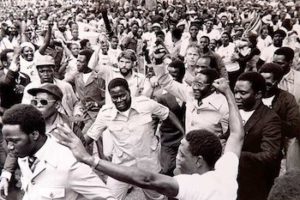
Zimbabwe gained independence from Britain on this date in 1980. This repaired the invasion of the 1884 Berlin Conference, the high point of white European competition for territory in Africa, a process commonly known as the Scramble for Africa.
Prime Minister Robert Mugabe consolidated his power in 1982 and dismissed Joshua Nkomo from his government. Mugabe’s party won a landslide victory in 1985, the first general election since independence. In late 1987, the constitution was amended to replace the position of prime minister with that of executive president, which combines the posts of head of state and head of government. At that time, ZANU-PF and Nkomo’s Zimbabwe African People’s Union (ZAPU) agreed to merge under the name of ZANU-PF.
In 1990, Mugabe officially appointed Nkomo as a second vice president, in addition to Simon Muzenda, in the reshuffled cabinet. In the 1990 elections, Mugabe and his ZANU-PF Party won decisively. In 1997, Mugabe announced a new program of land redistribution. About 1500 white-owned commercial farms, comprising almost half of Zimbabwe’s total commercial farmland, were designated to be nationalized without compensation in mid-1998 and divided among landless Blacks or Blacks with smaller farms. This plan was met with strong protests from white farmers.
Currently, for the first time in Zimbabwe’s history, there is a promise of multi-party democracy. Significant gains in the June 2000 parliamentary elections by the Movement for Democratic Change (MDC) prompted opposition leaders to predict that Zimbabwe’s now 76-year-old Mugabe could face the first real challenge to his 20-year rule in the 2002 presidential elections. An opposition party officially launched in September 1999, the MDC is a coalition of civil institutions that includes trade unions, professional associations, human rights organizations, and student and women’s groups.
Led by the Zimbabwe Congress of Trade Unions, MDC cites five main priorities, ranging from improving the economy and rejuvenating land reform to curbing corruption and making the current constitutional review process inclusive of all Zimbabweans. The goal is "to get the government to account for its decisions. The MDC has asked [the people], ‘What do you want to see in the Zimbabwe of the future?’" said Learnmore Jungwe, a prominent lawyer and one of the newly elected parliamentarians confident that MDC will expand ordinary Zimbabweans’ political sovereignty. Few could doubt that the spirit of democracy is a moving force today in Zimbabwe. In just the past 12 months, an opposition paper has sprung up in every province, and virtually all citizens now feel they have a stake in the political process.
Whether or not the Movement for Democratic Change succeeds in prematurely ousting the president or whether the rising tide of democratic fervor results in the emergence of other challengers, Mugabe will never again be the only architect of Zimbabwe’s future. With or without Western support, that seems to be the choice of Zimbabweans now, regardless of their political views. Reference: